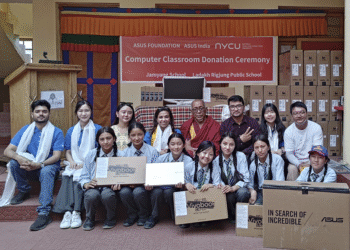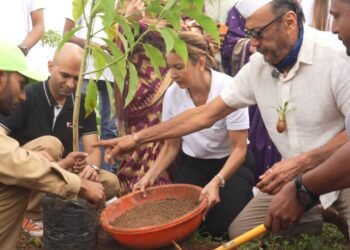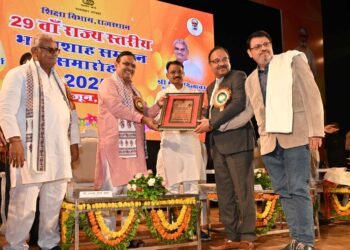The Company’s CSR policy aims to create a sustainable impact in the community and society. Its activities focus on specific strategic areas. The CSR activities are undertaken in three strategic areas namely community development, road safety, and skill development.
Maruti Suzuki India Limited spent over Rs. 140.9 Crore (Rs. 1,409 million) on Corporate Social Responsibility (CSR) projects in FY 2020-21, utilising the full budget for the purpose.
CSR Administrative Overheads stood at Rs. 7.19 million and an amount spent on Impact Assessment was Rs. 1.41 million for impact assessment study (FY 2020-21). Ten (10) CSR projects were taken up for the Impact Assessment Study.
The Company engaged Soulace Consulting Pvt. Ltd. for the evaluation of its CSR Projects. Soulace Research Team conducted field visits and telephonic interviews for data collection.
The company spent over Rs. 168.2 Crore (Rs. 1,682 million) on Corporate Social Responsibility (CSR) projects in last year. The company has spent over Rs. 154.1 Crore on CSR activities in FY 2018-19.
The projects are undertaken through the Maruti Suzuki Foundation in association with various implementation partners.
The average net profit of the Company for the last three financial years (2017-18, 2018-19, and 2019-20), calculated in accordance with the provisions of Section 198 of Companies Act 2013 is INR 70,450 million (Rs. 70,45.20Crore).
The prescribed CSR expenditure for the financial year 2020-21 was INR 1,409 million, which is two percent of the average net profit for the last three financial years.
The Company’s CSR policy aims to create a sustainable impact in the community and society. As a policy, the Company’s CSR activities focus on specific strategic areas. The CSR activities are undertaken in three strategic areas namely community development, road safety, and skill development. The Company’s CSR activities are guided by the CSR Committee. All the projects are regularly monitored and reviewed by the CSR Committee for their impact on the beneficiaries.
CSR in 26 Villages
The Company focuses on community development projects related to water, sanitation, health, education, and common community assets in 26 villages near its facilities in Haryana and Gujarat.
The projects are developed in consultation with the local communities. Key projects in the area of water and sanitation are potable water ATMs, water supply infrastructure, construction of individual household toilets, and laying of sewer lines.
The Company recognizes the need to improve community health and education status and has focused its efforts in Sitapur, Gujarat where there is a requirement for good health and education facilities. It is developing a 100-bed hospital in Sitapur in association with Zydus Hospitals and Healthcare Research Private Limited. The facility, spread over 7.5 acres, will be one of its kind in the area with emergency care and super-specialty medical services.
This project will supplement the Company’s ongoing efforts of supporting community health centers in villages through the up-gradation of medical infrastructure. The hospital will be equipped with clinical facilities such as radiology, ophthalmology, physiotherapy, gynecology, cardiology, orthopedic, urology, nephrology, and general surgery. Also, a residential facility will be provided to hospital staff.
The first phase of the hospital with 50 beds has started functioning in April 2021.
The Company is also setting up a senior secondary English medium school in Sitapur, Gujarat with a capacity of 1500 students. The school facilities include Laboratories, Indoor activity rooms, and a multisport playground. The first phase of the primary section of the school has started functioning in April 2021.
This year, the Company focused on providing the village leaders and local community members with the required support to face the challenges posed by the COVID-19 pandemic. At a larger level, the Company extended support to state and local administration in the fight against COVID-19. Leveraging its CSR funds, it provided 280 ventilators, 10,000 protective body suits, face masks, and antigen testing kits to the Gujarat and Haryana governments and other stakeholders.
Local villages were made aware of the COVID-19 safety protocols communicated by the government. During the lockdown period, the Company provided cooked food, dry ration, and other essential supplies to the local needy people. Drinking water and sanitation projects in the villages were also kept operational during the lockdown, with strict compliance to health protocols.
In the area of road safety, the Company implemented two technology-driven road safety projects in the national capital namely Traffic Safety Management System (TSMS) and Automated Driving Test Tracks (ADTT) in association with Delhi Government. Under the TSMS project, traffic surveillance systems, comprising of sophisticated 3D radars and high-resolution cameras, have been deployed at select high-volume traffic junctions, to capture traffic violations and allow Delhi Traffic Police to issue prosecution notices to offenders.
The Company is currently supporting the Police in the maintenance of the project infrastructure for a short period as per agreement. Under the ADTT project, driving test tracks are being laid and advanced cameras are being installed at 12 centers to support Delhi transport authorities in issuing computerized driving licenses in a transparent and efficient manner.
The Company continued to offer driving training at the seven Institutes of Driving and Traffic Research (IDTR) set up in association with various state governments across the country. In the area of skill development, the Company continued to support projects that are aimed to prepare the youth for employment opportunities in the manufacturing and service sectors.
Under its flagship skill development program, it has set up Japan-India Institute for Manufacturing (JIM) at Mehsana, Gujarat, and Uncha Majra, Haryana. Here, students undergo industrial training courses and learn Japanese manufacturing practices. This year, the government-approved Dual System of Training (DST – on-the-job training) scheme was implemented at the JIMs. Under this scheme, students will undergo theory and basic training at JIMs for five months.
They will also undergo on-job training (OJT) on the shop-floor of the Company/Suzuki Motor Gujarat Private Limited or partner industry for seven months and will be paid a stipend during this period. In the current financial year, 100% of students of JIM Mehsana have been placed. In addition, the Company provided industrial and soft skill training by adopting 115 Industrial Training Institutes (ITI).
The interventions at the ITIs include upgrading workshops, enhancing industry exposure for trainers and students, and imparting soft skills to make students industry-ready.




















